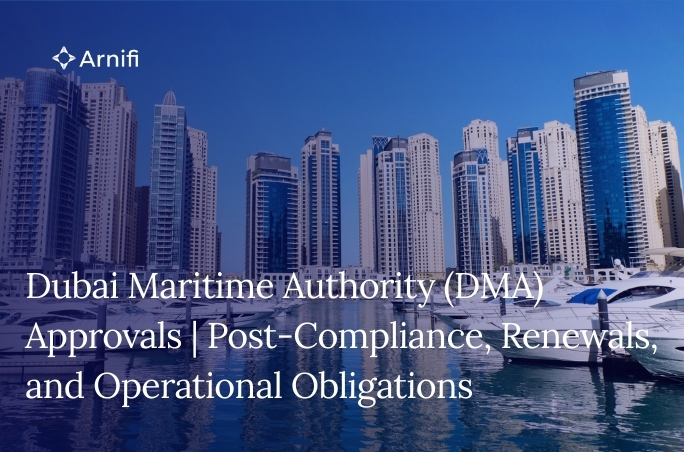Future Trends of Corporate Governance 2025 in UAE Businesses
by Shethana Nov 11, 2024  11 MIN READ
11 MIN READ

The UAE wants to build a strong and clear business setup. This effort is shown in its growing corporate governance framework. The country knows that good governance helps bring in foreign investments. It also helps support growth and keeps the economy strong for years to come.
In recent years, there have been important changes in the UAE’s corporate governance scene. These changes are mostly due to updates in rules and new laws. These reforms aim to match the UAE with international best practices. They will improve accountability, transparency, and investor confidence.
Overview of Recent Changes in Corporate Governance Norms
The legal rules for corporate governance in the UAE are strong and keep changing to fit the fast-moving business world. Recently, the new Commercial Companies Law (Federal Decree Law No. 32 of 2021) brought important updates to these rules.
One big change is the improvement of shareholder rights. This protects minority shareholders better. The law also focuses on the duties of the board of directors. It highlights how important independence, diversity, and skill in decision-making are for the board.
The new rules also stress better financial reporting and transparency. Companies must follow international accounting standards. This makes financial statements more reliable and easy to compare. As a result, it builds up investor confidence and helps create a stable and trustworthy business environment.
Impact of Global Trends on UAE’s Corporate Governance Practices
The UAE pays close attention to the best practices around the world and includes them in its corporate governance standards. This shows that the country is serious about creating a business-friendly environment. It wants to meet the expectations of the global economy. The UAE knows that strong corporate governance helps bring in foreign investment.
Sustainable practices, ethical behavior, and long-term value are becoming more important in the UAE’s corporate governance framework. We can see the growing importance of environmental, social, and governance (ESG) factors in recent laws and rules.
Also, the UAE sees that diversity and inclusion are key in corporate leadership. This means supporting women in leadership roles on boards and in senior management. By following these international trends, UAE businesses are seen as responsible and ethical in the global market.
Strategic Role of Technology in Enhancing Corporate Governance
Technology is changing many parts of business operations. Corporate governance is also being affected. The UAE sees how new technologies can improve transparency, efficiency, and security in corporate governance practices.
By adding technology, organizations can address the needs for better data security, real-time reporting, and strong risk management. This move highlights the UAE’s active effort to lead in global trends in corporate governance.
Adoption of Blockchain for Transparency and Security
Blockchain is gaining attention for being secure and open. It is a strong tool that can help improve security and build trust in corporate governance. Its decentralized and encrypted design may change how companies keep records, manage transactions, and protect data.
Using blockchain can greatly lower the risks of fraud, mistakes, and human error in keeping records. Smart contracts are a key part of blockchain technology. They make it easier to carry out and enforce contracts while enhancing transparency and responsibility.
Seeing its value, many government groups and private businesses in the UAE are starting pilot projects to test blockchain in areas like land registration, supply chain management, and verifying digital identities.
AI and Big Data Analytics for Decision Making and Compliance
The increase in data access brings both chances and problems for corporate governance. The UAE recognizes the strength of AI and big data analysis. These tools help in managing large data sets, aiding in decision-making, and keeping up with rules.
AI tools are very useful. They analyze a lot of data to find trends and important signals that might be missed. This helps companies to act on risks, boost compliance, and make better choices.
Also, AI can take care of many regular compliance tasks. This gives organizations more time and resources to work on important projects.
Sustainability and Environmental, Social, and Governance (ESG) Criteria
Sustainability and the criteria for environment, social, and governance (ESG) are now very important in how companies are run. In the United Arab Emirates (UAE), using ESG factors in business operations is key for creating long-term value and keeping the trust of stakeholders. Using sustainable practices can improve a company’s reputation, reduce risks, and encourage innovation. When UAE businesses follow international best practices in ESG, they can improve their corporate governance framework and make a positive impact on the business environment.
Incorporating ESG into Corporate Strategy and Reporting
Integrating ESG factors into business strategy is now a must, not just an option. Investors and stakeholders look at ESG performance as a key sign of a company’s ability to succeed and last over time.
In the UAE, many companies are taking action to include ESG principles in their strategies. They are working to find and reduce environmental and social risks linked to their activities and are focused on strong corporate governance practices.
Moreover, firms are not just following rules on ESG disclosures. They are adopting a complete way of reporting ESG by using recognized frameworks like the Global Reporting Initiative (GRI) and the Sustainability Accounting Standards Board (SASB). This helps them share their ESG performance clearly and openly.
Challenges and Opportunities for UAE Businesses in Adopting ESG
The UAE is doing a good job of promoting ESG integration, but there are still some challenges. Many small and medium-sized businesses (SMEs) might find it hard to understand ESG. They may also lack the resources needed to put ESG plans into action.
Still, there are great opportunities for businesses in the UAE if they adopt ESG practices. By dealing with ESG issues, companies can boost their brand image, attract investors interested in responsible investments, and stand out in the global market.
The UAE government plays a vital role in helping businesses with ESG. This support comes from creating rules that help, offering incentives, and sharing knowledge to improve understanding and use of ESG in different sectors.
Corporate Governance and Risk Management
In today’s connected and changing world, managing risks is very important for good corporate governance. A strong risk management framework helps organizations find, understand, and reduce risks that could harm their operations, reputation, and finances.
In the UAE, corporate governance is focusing more on the need for proactive risk management. They want to build a strong business environment where companies can expect, handle, and adjust to new risks.
New Approaches to Managing Financial Risks
The global economy is changing quickly. With rising geopolitical issues, businesses must use better and more active risk management strategies. Companies in the UAE are moving from old, separate methods of risk management to a complete and combined risk management framework.
This includes more than just spotting and measuring financial risks. Organizations are creating strong risk management strategies that cover all parts of their work. This includes operational risks, regulatory risks, and reputational risks.
A big part of this new approach is having clear responsibility for risk management at every level of the organization. This means building a culture where everyone is aware of risks. Employees need to know how they can help find and reduce possible risks.
Cybersecurity Threats and Governance Strategies
The rising use of technology puts businesses at risk from more cybersecurity threats. Data breaches, cyberattacks, and violations of data privacy can cause big financial losses and harm reputations and operations. The UAE understands how serious these threats are. That’s why it focuses on improving cybersecurity measures and strong governance to protect sensitive information.
Putting strict data protection policies in place follows international best practices. This also helps the UAE be seen as a safe and trustworthy place for businesses.
The Future of Board Composition and Diversity in UAE Businesses
The make-up of a company’s board of directors is very important. It affects how the company is run, the plans it makes, and its overall success. In the UAE, there is growing focus on having diverse boards. This helps bring in different ideas, experiences, and skills in key decision-making.
Having diversity in the boardroom encourages new ideas, improves risk management, and boosts the company’s reputation. These ideas are very important in today’s business world.
Evolving Role and Responsibilities of Board Members
The job of a board director is changing. It’s no longer just about following rules and keeping an eye on things. Today, board members need to understand more about the business world. This includes areas like digital change, cybersecurity risks, and environmental, social, and governance (ESG) factors.
Board members are now taking a more active role in shaping a company’s plans. They give advice and challenge managers to help the company continue to succeed in the long run. To do this well, board members need different skills. They should be able to share different views and help make better decisions.
Also, boards need to be quick and flexible, responding to changes in the market. This means board members have to keep learning. They need to stay updated on new trends and the challenges in the business environment.
Promoting Gender Diversity and Inclusion in Leadership Roles
The UAE knows that having more women in leadership roles, especially on corporate boards, is very important for strong economic growth. Many studies show that companies with board members of different genders usually do better than those that do not. When there are diverse views, it helps with making better decisions, managing risks, and encouraging new ideas.
To help women take on leadership roles, the UAE has started various programs. They have set goals for how many women should be on the boards of government-related organizations. They also are urging private companies to do the same.
Building a fair and welcoming work culture needs different efforts. This includes looking at biases we might not be aware of, offering mentorship to women, and making sure everyone has the same chances to grow in their jobs. The UAE is dedicated to improving gender diversity in leadership. This shows they are a forward-thinking supporter of gender equality in their region and beyond.
Regulatory Changes and Compliance Requirements
The rules for businesses in the UAE are always changing. This is to keep up with the market and global standards. The goal of these changes is to improve corporate governance, increase transparency, and make sure legal requirements are met.
To handle these changes, businesses need to stay updated on new laws. They should also know how these laws affect their work. It’s important for them to change their corporate governance practices to stay compliant.
Upcoming Legal Reforms in Corporate Governance
UAE businesses should get ready for new legal changes. These changes will support better corporate governance practices. They will help align the country’s rules with international best practices. This will also help address new challenges and opportunities in business.
One important reform could be improving the current corporate governance code. This may include tougher rules for board independence. It may also clarify what board committees are responsible for. Additionally, it will promote more transparency in how boards are evaluated.
The rules might also include stricter guidelines for ESG reporting. This means businesses will need to focus more on sustainability in their operations. They will have to be clearer about their ESG performance.
Navigating Through Compliance Challenges in a Dynamic Legal Environment
Operating in a changing legal environment means that UAE businesses must take a strong and forward-thinking approach to follow the rules. It can be hard to keep up with new regulations, understand how they affect business operations, and make the needed changes for compliance.
Businesses can reduce compliance risks by creating a culture that values following the rules. This includes setting clear policies and procedures, offering regular training for employees, and doing internal checks to ensure they meet legal and regulatory requirements.
In addition, businesses can get help from lawyers who know UAE corporate law well. This support can help them understand the complex rules. By staying updated, seeking expert help, and building a strong compliance culture, businesses can handle legal risks better and concentrate on their main activities.
In conclusion, the future of corporate governance for businesses in the UAE will be shaped by important changes. New rules, technology updates, and a stronger focus on sustainability and ESG standards will play big roles. It’s vital for firms to adopt new tools like blockchain, AI, and big data. These tools can improve transparency, support better decisions, and help with compliance. Focusing on diversity in board members and managing compliance issues in a changing legal world is key for success. If UAE businesses stay flexible and quick to adapt, they can lead the way in corporate governance excellence.10 Top Business Trends to Watch Out for in the UAE Market 2025
Also Read: 10 Top Business Trends to Watch Out for in the UAE Market 2025
Top UAE Packages

Related Articles
Top UAE Packages



